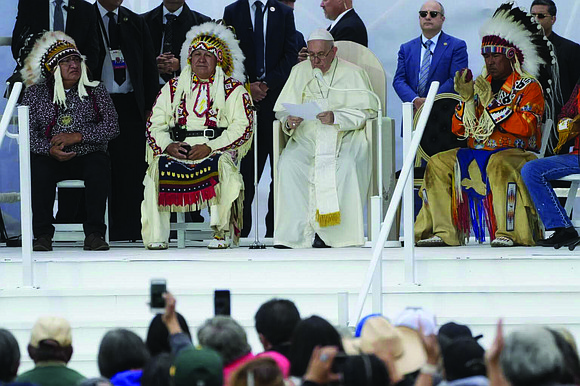In Canada, Pope Francis apologizes to Indigenous peoples, says it’s only ‘first step’
Claire Giangravé/Religion News Service | 7/28/2022, 6 p.m.

MASKWACIS, Canada - Pope Francis issued his first apology to the Indigenous peoples in Canada for the Catholic Church’s role in administering residential schools, which robbed many of their families and culture.
“I am here because the first step of my penitential pilgrimage among you is that of again asking forgiveness, of telling you once more that I am deeply sorry,” the pope said on Monday, July 25, to a crowd that included thousands of Indigenous peoples gathered at the circular arbor at Maskwacis, a traditional ceremonial site of the Cree, Dene, Blackfoot, Saulteaux and Nakota Sioux people, located just south of Edmonton.
“Sorry for the ways in which, regrettably, many Christians supported the colonizing mentality of the powers that oppressed the Indigenous peoples. I am sorry,” Pope Francis continued.
The pope asked for forgiveness for the role Church members played “in projects of cultural destruction and forced assimilation promoted by the governments of that time.” Residential schools often forcibly removed Indigenous children from their families and communities.
Recently, thousands of unnamed remains were found on the properties of the residential schools in Canada and the United States, sparking renewed outcry over the mistreatment and alienation of Indigenous peoples.
“The Church kneels before God and implores his forgiveness for the sins of her children,” Pope Francis said in his speech, which took place not far from the Ermineskin residential school. “I humbly beg forgiveness for the evil committed by so many Christians against the Indigenous peoples,” he repeated, adding that the apology comes with “shame and unambiguously.”
The pope circled the area aboard his popemobile before sitting on the stage to witness the arrival of the Indigenous leaders. Chief Wilton Littlechild, a former member of the Canadian Truth and Reconciliation Com- mission and once a student at a residential school, welcomed the pope.
“You have said that you come as a pilgrim, seeking to walk together with us on the pathway of truth, justice, healing, reconciliation and hope,” Chief Littlechild said. “We gladly welcome you to join us on this journey.”
Pope Francis brought to the meeting a pair of moccasins that were given to him by Indigenous delegations at the Vatican as a reminder of the suffering endured by their people at residential schools. He said they were a symbol that kept alive in him a “sense of sorrow, indignation and shame.”
In his speech, the pope spoke of the “deep sense of pain and remorse” he felt in the days leading up to the trip. He voiced his hope that this visit will serve not only as a reminder of the enduring pains of the past but also as the beginning of a journey of healing and dialogue.
Even though remembering can bring discomfort and hurt, the pope said, “it is right to remember, because forgetfulness leads to indifference,” which he said is the opposite of love, quoting the philosopher and Auschwitz survivor Elie Wiesel.
Pope Francis then listed the devastating effects and consequences of residential schools, from abuse to marginalization and the severance of family relationships. He thanked attendees for sharing their “heavy burdens” and “bitter memories” with him.
The pope’s words were met with tears and silence by those who were present, many of whom were wearing traditional clothing and regalia. Canadian Prime Minister Justin Trudeau also was present at the gathering.
The pope also acknowledged that apologies are not enough. “Dear brothers and sisters, many of you and your representatives have stated that begging pardon is not the end of the matter. I fully agree: That is only the first step, the starting point.”






